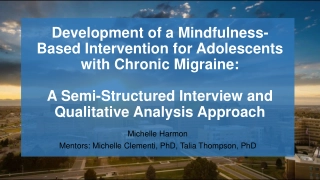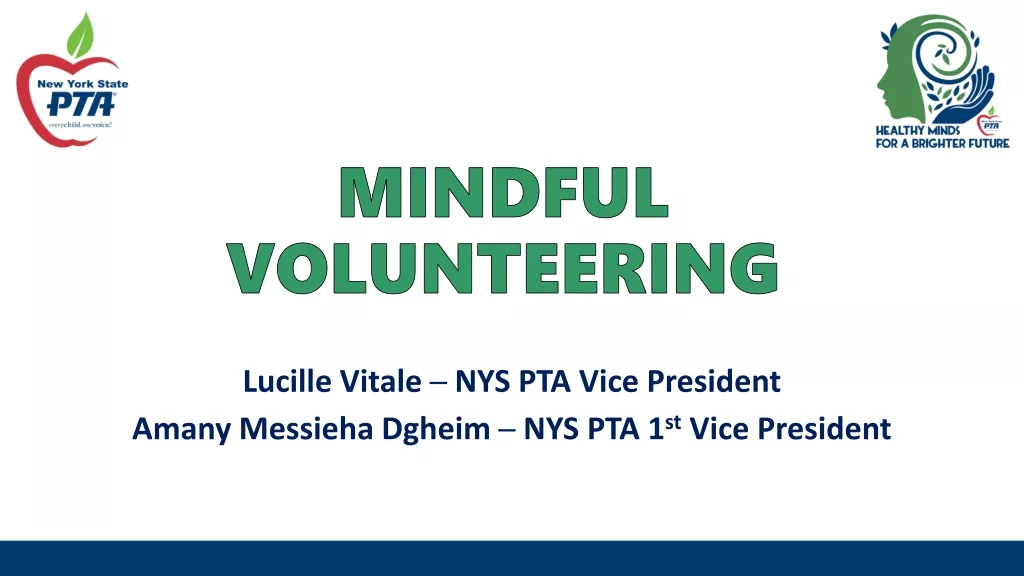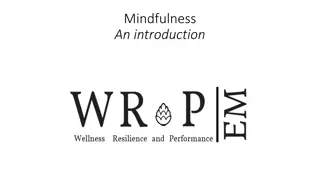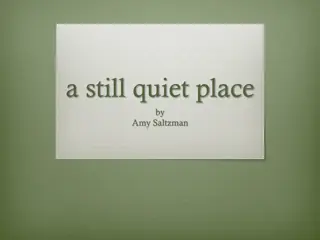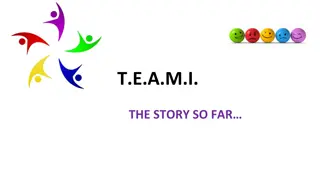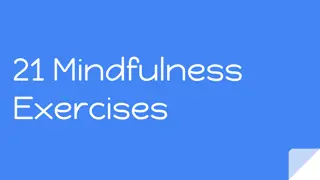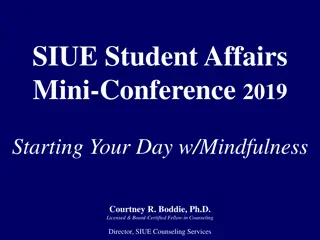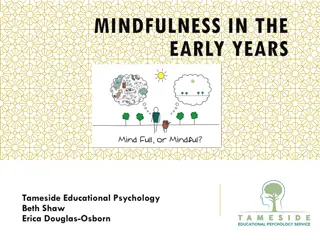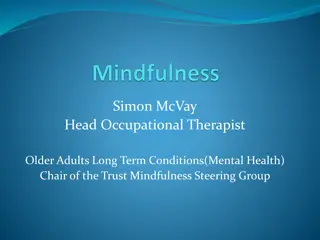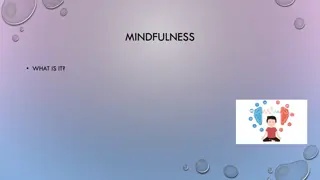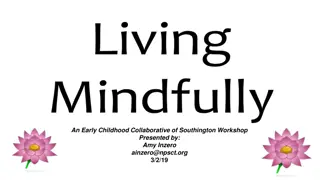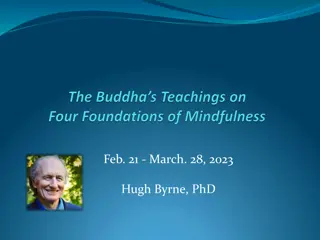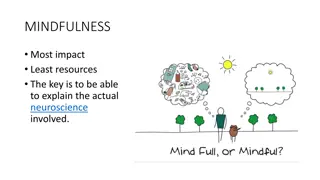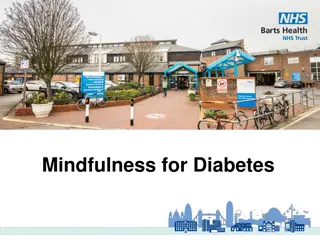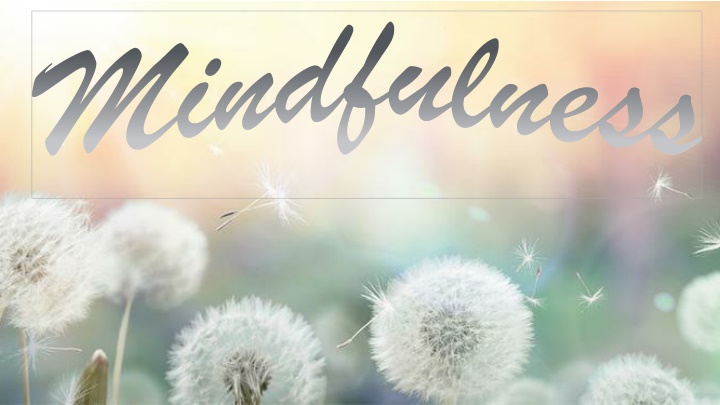
Discover the Power of Mindfulness for Teens & Meditation
Explore the transformative effects of mindfulness and meditation in teens' lives with powerful resources, research findings, and beginner guides to enhance well-being and reduce stress.
Download Presentation

Please find below an Image/Link to download the presentation.
The content on the website is provided AS IS for your information and personal use only. It may not be sold, licensed, or shared on other websites without obtaining consent from the author. If you encounter any issues during the download, it is possible that the publisher has removed the file from their server.
You are allowed to download the files provided on this website for personal or commercial use, subject to the condition that they are used lawfully. All files are the property of their respective owners.
The content on the website is provided AS IS for your information and personal use only. It may not be sold, licensed, or shared on other websites without obtaining consent from the author.
E N D
Presentation Transcript
Native American Legend https://www.youtube.com/watch?v=vzKryaN44ss
The Scientific Power of Meditation https://www.youtube.com/watch?v=Aw71zanwMnY https://www.youtube.com/watch?v=xNY0AAUtH3g Jon Kabat-Zin Founder of Mindfulness-Based Stress Reduction Stars https://www.youtube.com/watch?v=up3MZuYkf-g http://greatergood.berkeley.edu/topic/mindfulness/definition
Mindfulness for Teens Discovering Your Inner Strength http://mindfulnessforteens.com/ What is mindfulness, anyway? What is mindfulness, anyway?
http://mindfulnessforteens.com/ Mindfulness for Teens : Discovering Your Inner Strength Being a teen can be really stressful! Mindfulness is a powerful way to handle stress, and live life more fully. Mindfulness is all about living fully in the present moment, without judgment, and with an attitude of kindness and curiosity. It s about breathing, noticing what s happening right here and now, sending a gentle smile to whatever you re experiencing in this moment, whether it s easy or difficult, and then letting it go. You can be mindful anytime, anywhere, no matter what you re doing. It sounds simple, but it s not always easy to do, especially when you are stressed! This website provides information, tools, and resources to help you get started.
Retrieved from http://www.huffingtonpost.com/sarah-rudell-beach-/teaching-mindfulness-to- teenagers_b_5696247.html Why Mindfulness? Why Mindfulness? Teenagers may see mindfulness as completely unrelated to their busy and connected lives. Here are a few research findings: Studies show that students who meditate before an exam perform better than students who do not Mindfulness practice can improve concentration Mindfulness-based interventions have been demonstrated to reduce the symptoms of anxiety, stress and depression For studies see: http://www.huffingtonpost.com/2013/03/27/mindfulness-testing-focus-reading-comprehension_n_2957146.html http://www.nytimes.com/2007/05/08/health/psychology/08medi.html
Meditation 101 A Beginners Guide https://www.youtube.com/watch?v=rqoxYKtEWEc
https://www.youtube.com/watch?v=ZME0JKiweL4 Meditation & Relaxation https://www.youtube.com/watch?v=lnXrXX0m-NE https://www.youtube.com/watch?v=jaq4iZYBfXY https://www.youtube.com/watch?v=xI3sVuH7rms https://www.youtube.com/watch?v=9CdPQ7X1MzU Tense/Release
Theres an App for That! There s an App for That! Other Other U Useful seful S Sites ites http://leftbrainbuddha.com/ http://www.huffingtonpost.com/sarah-rudell-beach-/teaching- mindfulness-to-teenagers_b_5696247.html Other apps that you may find helpful: Headspace Buddhify Smiling Mind 10% Happier Stop, Breathe, Think Additional Resources Want more information? Check out the following links: MINDFULNESS 101 ~ FREE seven-day class! Meditation for Beginners ~ 20 tips from zenhabits {great site!} Mindfulness: The Basics from mindful.org A great book for beginners is Mark Williams and Danny Penman s Mindfulness: An Eight-Week Plan for Finding Peace in a Frantic World. Insight Meditation Timer Stop, Breathe, and Think Smiling Mind Take a Break! https://www.anxietybc.com/
anxietybc.com Youth Thinking Right
Our mind is constantly thinking about all sorts of things annoying siblings, hilarious memories, stressful homework deadlines, etc. There's a lot of brain electricity going on in there, like a machine with a switch that is always turned on. This constant background stream of thoughts is called your automatic thoughts and self-talk. It's important to find out more about these before you can conquer your anxiety. It's crazy the power that our thoughts have over our mood. You could be hanging out with your friends and be miserable because your worries are pulling you a million miles away. If you dwell on your worries and stresses, it's hard to have fun and really enjoy the present moment. The good news is that you can take charge of your thinking and feel calm and in control. The Thinking Right Tools can help. It will take some effort and practice. But isn't it worth it? Just because you think something doesn t mean it s true. Don t believe everything you think! http://youth.anxietybc.com/being-kinder-yourself-1
What are you telling yourself? For example, if you heard a noise outside your bedroom window at night, what might your automatic thoughts be? Maybe something like: "Outside attacker dark window locked? Break in phone is where? Hide." You might also have an automatic image flash in your head of a dark figure hiding in the shadows, peering around to see how to get in. These automatic thoughts are what set off your anxiety alarm, BIG TIME. So what if, instead of those alarming thoughts, your automatic thoughts were: "Noise outside what? Animal? Tree branch? Did Sam let dog in? Door is locked. Dad is here, safe. Listen more." Noticing these automatic thoughts might alarm you a little at first, but you ll also be more composed and able to make rational choices and calmly take action if needed (instead of freaking out!). When we perceive something like a noise outside the bedroom window at night very short, quick thoughts or images enter our mind almost automatically. These thoughts and images happen so fast that they are called automatic thoughts. Automatic thoughts are part of our self-talk. Often we are not even aware that we have them. http://youth.anxietybc.com/automatic-thoughts
What are you telling yourself? Or, you can have thoughts like: "I'm nervous about the exam, but that means it's important to me, and I want to do well. I've studied for it, and all I can do is my best tomorrow. I will listen to my test anxiety visualization tomorrow morning and remember the test- taking steps. I won't let my anxiety stop me." Thoughts like this will help you feel: Self-talk is basically just the constant chatter that is going on in your head. It's important to remember that your self- talk is not always true or meaningful. It's definitely not always helpful or productive. Let's take an easy example. The night before an exam you might have thoughts like: "What if I fail this exam and then have to take summer school and none of my friends do. Then I flunk out of high school and have to work a crappy job for the rest of my life, if I can even GET a job?" How would this chain of thoughts make you feel and behave? Nervous and irritable, develop a stomach ache or headache, have tight muscles, maybe lose sleep, yell at your mom. Not exactly the best state in which to take an exam! Calmer, more confident and in control, and more likely to be able to sleep now that you have a plan.
So how you react depends on the meaning you give to the thing or event, and what you say to yourself. It is how you are thinking about the situation that is giving you anxiety, not the situation itself! You may have some negative self-talk like: "Everyone will think I'm stupid and boring my hands will shake face red stutter what if I faint? Totally embarrassing. Want to die." You have these types of thoughts because what others think about you is important to you. There is nothing wrong with that. So the "danger" if you mess up is that everyone might think badly of you, and you would beat yourself up too. So if these automatic thoughts pop up first, it makes total sense that you would feel anxious about the talk. So why do I make such a big deal out of little things? Let's say you have to give a presentation in front of the whole class. You're not in any real danger, right? No tiger is going to jump out from under a desk and maul you if you don't do a good job. The other students won't attack you or throw eggs at you (um, probably not). But in fact, giving a talk in front of the class actually IS a potentially "dangerous" situation, because it could hurt your pride or lead you to feel embarrassed and judged, or you could get a bad mark. If you tend to beat yourself up for mistakes or get embarrassed easily, talking in front of others is a big risk, and in a sense, really feels dangerous! Remember just because a thought or image pops in your head quickly, doesn t mean it is accurate or even realistic. Catch and challenge these pesky automatic thoughts, they are sneaky and quick
Thinking Traps Certain types or patterns of thoughts tend to trap us in anxiety. These are called Thinking Traps. Some teens have lots of anxious thoughts about the future. Some focus more on what other people are thinking. Some think about wanting to stay safe and see danger lurking around every corner. Others seem to always imagine the worst possible scenario! Whatever thinking traps you tend to fall into, the first important step is to recognize your personal traps. Below is a list of common thinking traps. Thinking Trap:All or Nothing Thinking (or Black and White Thinking) What's Going On Thinking only of possible outcomes at either extreme (really good or really bad) and not seeing all the possible outcomes in-between (or the "grey"). Most of life is somewhere in the middle. Examples One friend gets angry at you "Nobody likes me, I'm totally unlovable and selfish." Failing one test "I'm obviously a stupid loser." Presentation at school "I'm going to either ace the performance or totally flop."
Thinking Trap:Catastrophizing What's Going On Imagining the worst-case scenario, no matter how unlikely in reality. Examples Getting one bad grade "I won't get into university and I'll end up homeless." Mom and Dad have a fight "They are obviously going to get a divorce." Thinking Trap:Overestimating What's Going On Exaggerating the likelihood that something bad will happen. Examples "If I have another panic attack I'm going to have a heart attack and die!"
Thinking Trap:Fortune Telling What's Going On Believing you can predict the future. But you can't because you don't have a crystal ball. Examples "I couldn't find a job last summer so I won't be able to get one this summer." "No one is going to talk to me at the party." Thinking Trap:Overgeneralizing What's Going On Making sweeping judgments about ourselves (or others) based on only one or two experiences. These thoughts typically contain the words "always" and "never." The problem: you can never be summed up in one word or base your value as a person on only one single experience! Examples One friend gets upset at you "I always screw up friendships. I have no real friends." Missing one soccer goal "I never get things right."
Thinking Trap:Mind Reading What's Going On Believing you know what others are thinking (and assuming it's negative), without any real evidence. The problem: you can't read minds, so stop trying. Examples "I know they are talking about me right now. They are thinking about how weird I look." "Everyone is wondering what I'm doing at this party." "I know she thinks my gift is lame." Thinking Trap:Negative Brain Filter What's Going On Focusing only on the negative without seeing any of the positive or what is going well. Examples Thinking about the one person you didn't have a smooth conversation with at the party, rather than the three people with whom you had great conversations. Thinking about the question you couldn't answer on the test, rather on the ones you could. See mindtraps handouts posters file
So how will all this "thinking stuff" help my anxiety? So just to recap, we know that anxious thinking is often extreme, unbalanced, and overly negative. But it can feel true, especially if it feels very familiar to you. This is because you have told it to yourself thousands of times. There are some tools that, if used regularly and consistently, can really help you deal with your anxious self-talk. Here are two options: Let your anxious thoughts come and go. Challenge your thoughts and come up with more helpful self-talk. The one thing that doesn't work very well is just constantly ignoring or pushing down your anxious thoughts. Sure, you can postpone them for a bit, and sometimes this is helpful. But the thoughts tend to sneak back and are usually even more persistent.
Step 1: Pay Attention No matter what, the first step is to start to pay attention to what you are saying to yourself. This can be difficult because thoughts can be so fleeting and automatic ("automatic thoughts"). Lots of teens find it helpful to practice noticing and then writing down their thoughts in a Worry Diary. Worry Diary exercise: For two weeks, write down your worries as they pop up. By writing them down, you don t have to keep track of your worries in your head anymore. You might find that a lot of worries don t seem so powerful a few hours later, and especially after a good night s sleep. Step 2: Choose a Tool We will look at four tools to help you feel less anxious. Try each of them consistently for at least two weeks and see which is the most helpful for you. You will likely want to use more than one tool. A good place to start is with the first tool and go from there!
Tool # 1 Challenge Your Stinkin Thinkin Have I been in this type of situation before? What happened in the past? What would I tell my friend if he or she was in this situation? What would my best friend tell me in this situation? What would I tell my friend if he or she was in this situation? In one month, how much will this really matter? In one year? In five years? How much of this is my responsibility? How much of this is the responsibility of other people? How much of it is outside my control? Am I blaming myself for something that is not 100% in my control? What s the worst thing that could happen? If the worst thing DID happen, what could I do to handle it? Are there any other possible explanations? Is this a hassle or a horror? What s the best thing (or some good things) that could happen?
Tool # 2 Tell Yourself Helpful Things The Challenge Your Stinkin Thinkin tool helped you learn to pay attention to your thoughts and evaluate how realistic they are. This next tool involves purposely telling yourself more helpful and comforting things, rather than believing all your pesky anxious thoughts. First, sit down and come up with a list of general helpful statements that you can say in any situation. Try writing some of them down on little coping cards, or email or text them to yourself so you can look at these statements when you need to. Repeat these statements to yourself every day for two weeks. It may feel unnatural or fake at first, but keep at it and these thoughts will slowly feel more familiar and true (because they are true!). If you practice saying these things to yourself, then over time these more helpful thoughts will start to pop into your head on their own.
Either you control your attitude or it controls you. Examples of general statements: The world is a pretty safe place. I can do this, I will be OK. I am stronger than I think. I can handle this. I can cope with most things. I can feel anxious and still do it. I will not let anxiety stop me from my dreams. It s just anxiety, it s not dangerous, and it s just temporarily uncomfortable. These are just my anxious thoughts. I don t have to believe them. I don t need to assume the worst. It s okay. Or you can come up with some helpful coping statements for a specific situation. For example, if you have to debate a topic in front of your class and are afraid of messing up or of others laughing, write down and repeat specific statements to yourself such as: Who cares what others think, they won t be perfect when it s their turn! I did this in class last year and I can do it again. I have time to practice. I can ask for help. I m intelligent and interesting. It will go great. Hey, I can handle this. I ve been embarrassed before and the feeling doesn t last forever. If I mess up, what s the big deal? I will laugh at myself with them and keep going. Oh, there are my anxious thoughts again. I don t have to believe them, I can just let them go.
Tool # 3 Letting Thoughts Go If you have tried tools #1 and tools #2 consistently for at least two weeks, but you want to try a somewhat different approach, this tool might be for you. Instead of analyzing, challenging, or replacing an anxious thought with a more helpful thought, you can simply observe it and acknowledge that it is just a thought. See if you can just let it go without giving it any power. Imagine you suddenly have this anxious thought: "What if the plane crashes?" With this tool, instead of challenging it, or replacing it with calming or confidence-building thoughts you may instead say to yourself something like: "Hmmm, that was a random weird thought that just popped up in my head!" "Huh, no wonder my heart is racing, if that is what my brain is imagining. It s just a thought and I can let it go." Be curious about your thoughts, without getting caught up in them. It s like standing outside yourself watching your thoughts come and go. This is different than ignoring or pushing away thoughts, because you are acknowledging your thoughts for what they are (just thoughts!) rather than avoiding them. You might find it helpful to imagine your thoughts as clouds floating in the sky: they float in and eventually change shape or disappear. You can just watch them float past you. Some teens like to picture their thoughts as leaves flowing down a gentle stream. They come into your field of view, but if you don t reach out and pick them out of the stream, eventually they will continue to float down the stream and out of sight. In fact, if you think about it, all your thoughts are really just a constant flow of leaves down a stream. You can choose which leaves to grab and which to let float by.
Tool #4 Make Uncertainty Your Friend A major trigger for anxiety is uncertainty. When you are not 100% sure of something you are more likely to worry about it. For example, if you aren t sure of a decision (like picking a topic for a school project or whether to apply to a certain university) or of how something is going to turn out (such as what s going to happen at that party), you re probably going to worry. By worrying, we are trying to figure out all the possible ways things could go wrong so we can be more certain of the outcome. The problem is that almost everything in life is uncertain because no one can predict the future. If being uncertain about something makes you feel anxious, the best way to deal with it is to learn to become more comfortable with the experience of not knowing. One-hundred percent certainty about things is what you are trying to accomplish when you worry. This doesn t work! If it did work, anxiety wouldn t be a problem because you would already know how everything turns out! We also try to gain certainty by repeatedly checking things or constantly seeking reassurance from others, such as asking, Are you sure you re not mad at me? or Are you sure you won t leave me alone at the party? (FYI this can get pretty annoying.) So how do you become comfortable with uncertainty? The best way is to build your tolerance of it and to face your fear of not knowing.
Examples of this strategy might be: not re-reading texts or emails before sending them ordering something completely new at a restaurant completing a homework assignment without asking Mom or Dad to look it over first delegating an important part of a group school project to someone else not asking a friend if he or she likes something new that you bought telling yourself you ll just have to see what happens at the party, rather than mentally rehearsing all your actions and conversations beforehand At first you will probably feel anxious when you try using these tools. That is a sign you are on the right track! But the more you do it, the less anxious you ll feel. Don t take our word for it. Test it out! Watch the anxiety decrease as you fight your fear of uncertainty! Final Note Remember: The only way to get over anxiety is to face it head on! All these tools will probably feel uncomfortable when you first try them. Whenever we try something new or different, it usually feels a bit strange. This does not mean that you are doing something wrong. It means that you are starting to face your fears and get over them. The goal is not to prove to yourself that things will always work out (although most of the time they will), but to let yourself sit with anxiety or uncertainty and be okay. It will take practice and perseverance, and falling into some traps again and again, but if you keep using your tools you will start to feel the benefits.
Autobiography in Five Short Chapters By Portia Nelson Chapter I I walk down the street. There is a deep hole in the sidewalk. I fall in I am lost I am helpless It isn t my fault. It takes forever to find a way out. Chapter II I walk down the same street. There is a deep hole in the sidewalk. I pretend I don t see it. I fall in again. I can t believe I am in the same place. But, it isn t my fault. It still takes a long time to get out. Chapter III I walk down the same street. There is a deep hole in the sidewalk. I see it is there. I still fall in it s a habit. My eyes are open. I know where I am. It is my fault. I get out immediately. Chapter IV I walk down the same street. There is a deep hole in the sidewalk. I walk around it. Chapter V I walk down another street.



